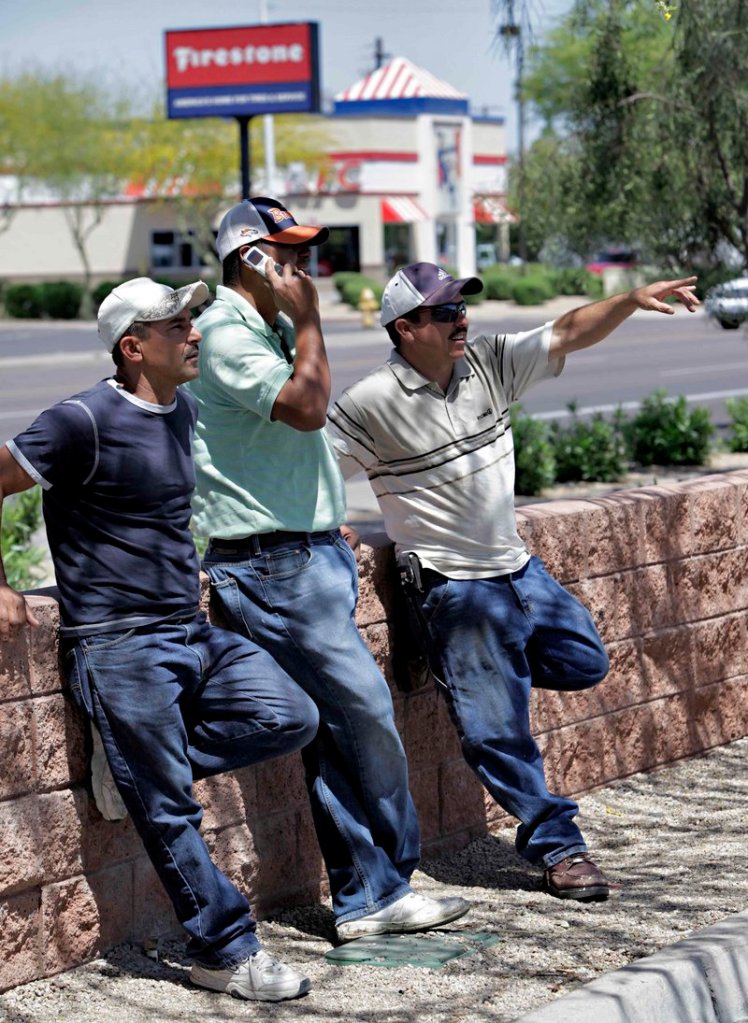PHOENIX — Many of the cars that once stopped in the Home Depot parking lot to pick up day laborers to hang drywall or do landscaping now just drive on by.
Arizona’s sweeping immigration bill allows police to arrest illegal immigrant day laborers seeking work on the street or anyone trying to hire them.
It won’t take effect until summer but it is already having an effect on the state’s underground economy.
“Nobody wants to pick us up,” Julio Loyola Diaz says in Spanish as he and dozens of other men wait under the shade of palo verde trees and lean against a low brick wall outside the east Phoenix home improvement store.
Many day laborers like Diaz say they will leave Arizona because of the law, which also makes it a state crime to be in the U.S. illegally and directs police to question people about their immigration status if there is reason to suspect they are illegal immigrants.
Supporters of the law hope it creates jobs for thousands of Americans.
“We want to drive day labor away,” says Republican Rep. John Kavanagh, one of the law’s sponsors.
An estimated 100,000 illegal immigrants have left Arizona in the past two years as it cracked down on illegal immigration and its economy was especially hard hit by the Great Recession. A Department of Homeland Security report on illegal immigrants estimates Arizona’s illegal immigrant population peaked in 2008 at 560,000, and a year later dipped to 460,000.
The law’s supporters hope the departure of illegal immigrants will help dismantle part of the underground economy here and create jobs for thousands of legal residents in a state with a 9.6 percent unemployment rate.
Kavanagh says day labor is generally off the books, and that deprives the state of much-needed tax dollars. “We’ll never eliminate it, just like laws against street prostitution,” he says. “But we can greatly reduce the prevalence.”
Day laborers do jobs including construction, landscaping and household work for cash paid under the table. Those jobs have been harder to find since the housing industry collapsed here several years ago.
Standing near potted trees and bushes for sale at a Home Depot in east Phoenix, Diaz, 35, says he may follow three families in his neighborhood who moved to New Mexico because of the law. He says a friend is finding plenty of work in Dallas.
Diaz says he has too much to lose by staying – he supports a wife and infant son back home in Ciudad Juarez, Mexico, across the border from El Paso, Texas.
“They depend on me to survive,” he says. “I’m not going to wait for police to come and arrest me.”
Jose Armenta, a 33-year-old illegal immigrant from Mexico’s western coast, is already planning to move to Utah within the next 20 days.
“A lot of people drive by,” he says as he watched nearby cars speeding past, “and they yell, ‘Hey, go back to Mexico!”‘
Analysts say it’s too soon to tell what lasting effects the law will have on the state’s underground work force, which also includes baby sitters, maids and cooks.
A study of immigrants in Arizona published in 2008 found that non-citizens, mostly in the country illegally, held an estimated 280,000 full-time jobs.
Losing hundreds of thousands of unskilled laborers wouldn’t hurt the state’s economy in the short term, but it could limit the economy’s ability to grow once it recovers, says Marshall Vest, director of the Economic and Business Research Center at the University of Arizona’s Eller College of Management.
Legal workers who are willing to take any available job now will become more choosy if the unemployment rate falls back to low levels seen before the recession hit.
Copy the Story Link
Send questions/comments to the editors.



Success. Please wait for the page to reload. If the page does not reload within 5 seconds, please refresh the page.
Enter your email and password to access comments.
Hi, to comment on stories you must . This profile is in addition to your subscription and website login.
Already have a commenting profile? .
Invalid username/password.
Please check your email to confirm and complete your registration.
Only subscribers are eligible to post comments. Please subscribe or login first for digital access. Here’s why.
Use the form below to reset your password. When you've submitted your account email, we will send an email with a reset code.